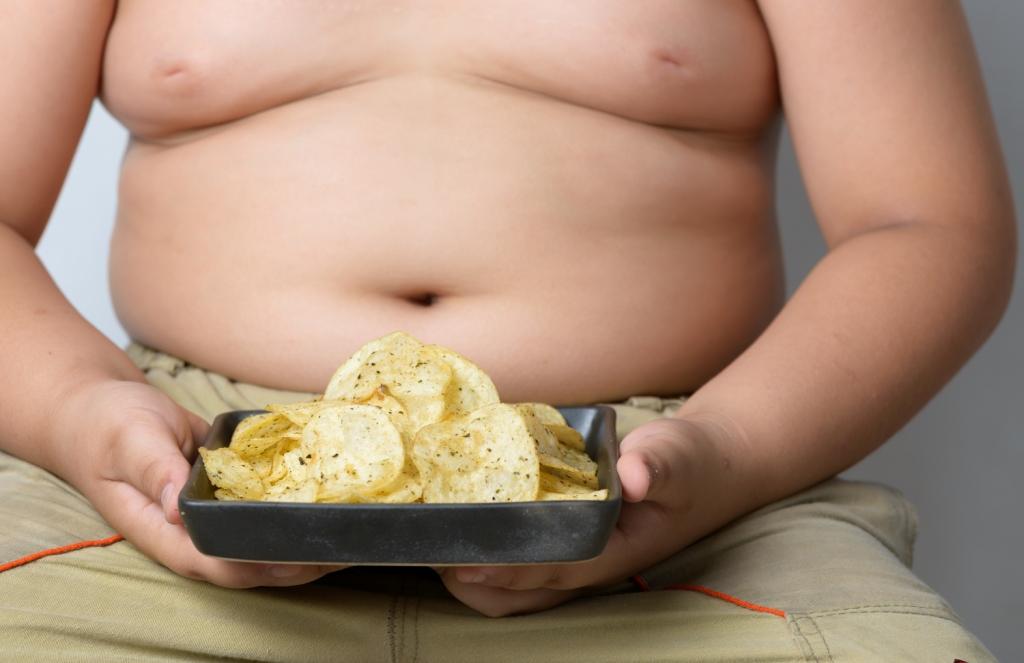 Feed to Fulfill, not to Fill Feed to Fulfill, not to Fill An anxious mother walks into a paediatrician’s clinic with her 2 year old hyperactive son for a customary checkup. Her first concern (which no longer baffles the doctor) is “My son is not gaining weight. I try to feed him every 2 hours but he is refusing to eat. Is he healthy?”. On a closer examination, the paediatrician observes the child’s weight to be dangling in the lower quartile of his ideal weight category. He smiles at the mother and exclaims, “Your son is perfectly healthy, sound and active. I am glad someone brought in a thin child today; and that, I do not need to prescribe a weight loss diet chart for a 2 year old!” We unfortunately belong to a society where the health, wellness and growth of an infant and a child are measured with the figures on the weighing scale and the thickness of skin folds! Excessive formula feeding, incorrect eating pattern and choices, physical inactivity and of course, not to rule out genetics and ethnicity, have been a few causes of childhood obesity. Physical activity and nutrition and are the foremost aspects for growth and development of children. Easy access to media and indoor entertainment, too little outdoor activity, mindless overfeeding and extravagant binging, and poor nutritional quality of food has turned spirited dynamic little imps into sluggish unhealthy youngsters. Children are fed to fill their tummies rather than to fulfill their nutrient requirements. And these children grow up into equally unhealthy adults plagued with multiple metabolic and psychological disorders. Dating back to days where the sole available nutrition source for an infant was mother’s breast milk and home cooked food, limited access to junk food and high physical activity played a positive role in building up immunity and providing adequate nutrition for growth. With passing decades, a plethora of quick-fix, instant, palatable meal options and a drastic decline in physical activity lead to an alarming incidence of unhealthy weight gain, obesity and debilitating life conditions in children as young as 5-10 years of age. And with the prevalence of overweight and obesity surging manifold every year, children and adolescents have to be put on weight loss diet plans to combat this monstrous evil and reform healthy habits. Overweight and obese children are likely to remain obese through adulthood and susceptible to a myriad of infirmities like diabetes, hypertension, hypercholesterolaemia, fatty liver, gastro-oesophageal reflux disease, asthma, sleep apnea, immune disorders, lower hip/back pain, arthritis, bowed leg, flat feet, muscle weakness, behavioural disorder, menstrual abnormalities and PCOS, cardiovascular disorders and even cancer. Obesity at a young age only amplifies the psychological miseries an adolescent is likely to go through later in life. 8 out of every 10 obese kids suffer from poor self esteem and depression as a result of being bullied, few even go ahead to develop headaches and intracranial pressure, which turns severe during adulthood and may require critical intervention. More about the complications of childhood obesity can be cited at https://www.mayoclinic.org/diseases-conditions/childhood-obesity/symptoms-causes/syc-20354827 http://700childrens.nationwidechildrens.org/complications-of-childhood-obesity/ While fundamental lifestyle patterns in children are more feasible to buckle down, genetic factors can be tough opponents! Mutations in LEP (the hunger hormone leptin) and its receptor LEPR, genes from the hypothalamic leptin-melanocortin pathway like POMC-ADCY3, PCSK1, MC4R, BDNF, and other gene loci like NTRK2B and SIM1 are implicated in severe childhood obesity and confer strong susceptibility to adulthood obesity. Gene-environment interaction studies reveal that with sustained healthy lifestyle practices, the adverse effects of these mutations can be suppressed to a large extent, or at least delayed, if not abrogated. Additional information about the genetics and epigenetics of childhood obesity can be acquired from https://www.ncbi.nlm.nih.gov/pmc/articles/PMC3639324/ World health organization has acknowledged obesity as one of the most afflictive health conditions. The statistics are unnerving. On an average, 1 in every 5 children from primary school are overweight/obese and by the time they leave primary school, the ratio goes down to 1:3! Almost 50% of all overweight children lesser than 5 years of age hail from Asia with India scoring the second position after China across the globe. Child nutrition, lifestyle and dietetics is a rapidly growing field and has attracted the attention of researchers to understand the mechanism of this vicious cycle engulfing the quality of life of millions worldwide. Ironically, childhood obesity is an issue that can be tackled at its elementary level at home. Adults/parents or caregivers have to put in basic, yet conscious efforts towards inculcating healthy eating habits and establishing active lifestyle by not only mentoring their children but also setting examples. To start with, understanding the nutritional requirement of a child as early as his/her infancy is of absolute importance; understanding that by feeding empty calories to a child will only debilitate growth and health; recognizing the need to provide a balanced diet with appropriate portion control and not overfeeding children with calories ad libitum; staying involved and participatory in most of their choices; and last but not the least, encouraging plenty of physical activity to keep their mind and body agile. |
AuthorDietitian & Nutritionist Dr. Nafeesa Imteyaz. Archives
May 2020
Categories |
- Home
- Written Testimonials
- Consult
- Clinics
- Blogs
-
Diet & Nutrition
- Diabetes Reversal
- IVF IUI not needed for PCOS PCOD Infertility
-
Medical Nutrition
>
-
Disease & Conditions
>
- Infertility | PCOS
- Diabetes Mellitus
- Cholesterol
- Hypothyroid
- Kidney Problems
- Hypertension
- Cardiovascular Diseases
- Liver Diseases
- Gastro intestinal disorder
- Cancer
- Metabolic Disorders
- Orthopedic Disorders
- Eating Disorders
- Dietary Recall
- Weight Record Filled By Clients
- Online Payment Transaction Details
- Online Clients Weight Check Form
- Our Program Package Service Charges
- Weight Record 2017 Clients
- Measurements sent by Clients
- Terms & Conditions Of Payment
- Thanks. Your Form is Submitted
- Video Testimonials
- Lifestyle & Wellness
- Lifestyle & Wellness Blog
- Allergy & Intolerance
- Weight Loss / Gain
- Weight Loss / Slimming Blog
-
Disease & Conditions
>
- Life Cycle Nutrition >
- Sports Nutrition >
- Integrity in Nutrition
- Knowledge Centre
© COPYRIGHT 2022. ALL RIGHTS RESERVED. FRST HEALTHCARE PVT LTD.
Dr. Nafeesa Imteyaz of First Eat Right clinic, is the Best Dietitian Nutritionist in Bangalore. Best Dietitian Nutritionist in Pune. Best Dietitian Nutritionist in Hyderabad. Best Dietitian Nutritionist in Chennai. Best Dietitian Nutritionist in Mumbai. Best Dietitian Nutritionist in Delhi. Best Dietitian Nutritionist in Kolkata.


